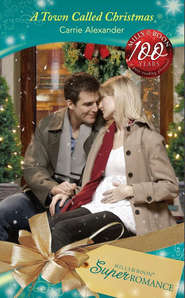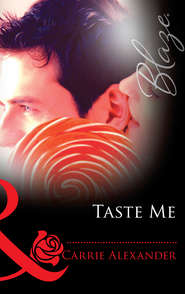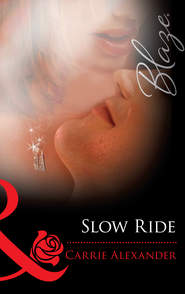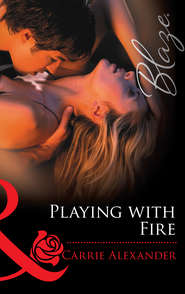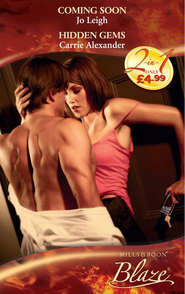По всем вопросам обращайтесь на: info@litportal.ru
(©) 2003-2025.
✖
My Front Page Scandal
Автор
Год написания книги
2019
Настройки чтения
Размер шрифта
Высота строк
Поля
“They do when they were adopted by Italian sugar beet farmers.”
“Italian sugar beet farmers?” She was delighted. “Is there such a thing?”
“Sure. Mama and Papa Carerra. But I was thirteen when I went to live with them, so I call them Marie and Geno.”
She chafed her thighs beneath the napkin. “Isn’t it unusual to be adopted when you’re thirteen?”
His gaze held steady. “Sixteen, actually. They were my foster parents before the adoption.”
“I’m sorry you lost your parents.”
“I didn’t lose them. They lost me.”
“Oh.” She wasn’t sure what he meant. They were alive? She wanted to ask, and the hard, bright jewels that were his eyes practically dared her to ask, but her Bostonian reserve wouldn’t allow it. “I lost both of mine,” she said instead. “My dad of a heart attack. My mother passed on only a few months ago. Pancreatic cancer.”
David touched her arm. “That’s rough.”
Brooke nodded, having to swallow the wave of grief that rose unexpectedly. When she was certain she could speak without a tremor, she unclenched her teeth. “It’s been complicated, too.” She found herself speaking in a rush, telling him—a virtual stranger—about the events that loomed so large in her mind. She didn’t know why, except that she was comfortable with him. And she wanted to make a connection beyond wearing a sexy dress and flirting. “My sisters and I recently learned that my mother had been hiding a secret past during her entire marriage. We have a half-sister we never knew about.”
His eyebrows went up.
A brief chuckle rasped her throat. “Turns out that our family history isn’t as stodgy as we’d always believed.”
His gaze dropped to her plunging V-neckline. “You don’t seem stodgy to me.”
“My ancestors.” On impulse, she sat taller, letting her lightweight coverup slip off her shoulders. David scanned the dress—her body—with an appreciation so intense his gaze was like a green laser beam passing over her. A scorching green laser beam. “I’m not stodgy,” she said, which would have usually been a lie, but not tonight. “Not in the least.”
“Absolutely not,” he echoed in a lazy, singsong voice so warm and welcoming it felt like lounging in a hammock on a summer day.
She wanted to bask in it, even though she suspected that he’d seen through her charade and was teasing her again. “I like your accent, Georgia.”
The corner of his mouth twitched. “I like yours, too, Boston.”
“Brookline,” she said. “I live in Brookline now. Again, that is. I grew up there, and moved back home when my mother became ill. We had a nurse, too, but she wanted—I wanted—we all wanted a family member there with her.”
“And they chose you, the artsy rebel of the bunch?”
Ah, the power of a sexy dress. He really had the wrong idea about her. She loved it.
“I’m also the oldest,” she explained. And the most responsible. But both Joey and Katie had been there to help, visiting often, spelling Brooke whenever they saw she was overwhelmed, especially in those final months when her mother had been in and out of the hospital.
“You’re not anymore,” David said.
“What?” She pressed her fingertips to the corners of her eyes and gave her head a shake. “Oh. You mean being the oldest. I keep forgetting about that. It’s strange.”
“Like getting a new identity. One you didn’t ask for.”
“Yes!” She looked at him, struck by his insight. Her sisters had been shocked by the revelation about Lindsay, of course, but their positions in the family hadn’t changed significantly. Joey was still a middle sibling, straddling the line between proper behavior and improper sass. Katie remained the free-spirited baby sister.
Only Brooke, who’d always taken her role as the big sister very seriously, had been completely displaced.
But maybe that’s good for you, she told herself. Maybethat’s part of why you feel so different tonight.
“It’s like I’m not me anymore,” she said. Worse, her identity had been altered without her consent. “Especially with my mother gone, too.”
Her father, John Winfield, had been the rock of the family, and Daisy Winfield had been the heart. While her grandparents remained on their estate and there was Great Aunt Josephine next door, keeping a stern eye on her nieces, the family she’d always counted on would never be the same.
“I know what that’s like,” David said in a wry tone.
Before she could ask why, a waiter in black pants and a crisp white shirt arrived with the bottle of wine. “On the house,” he said while pouring their glasses. “Courtesy of Mr. Vicenzi.”
The waiter departed. “Freebies,” Brooke said, heartened at the further evidence that David wasn’t as friendless as it had first appeared. “So it seems you aren’t despised everywhere.”
He shrugged, absently swirling the wine.
She remembered that he was on pain medication. “You shouldn’t be drinking with a head injury.”
She’d asked earlier how he was feeling. He’d been cavalier in brushing off the severity of the accident, claiming he had only a few bumps and bruises. The wide bandage that had wrapped his head was now a large patch over his temple.
“I never follow the rules.” He lifted the glass. “I’ll have a couple of sips, to be polite.”
“All right.” She touched their glasses. “Cheers to those who wish us well.”
“All the rest can go to hell.” He tipped his glass and drank with gusto, one long pull that drew her eyes to his strong neck. He had muscles there, too. He probably even had muscles in his pinkie toes.
“Let’s not consign them to hell.” She put a hand on his, urging him to put the glass down. “Maybe a few hours in a sauna cranked high.”
He looked at her through narrowed eyes. “I suspect that you don’t have enemies.”
After a moment’s thought about the old guard at work, who couldn’t really be called enemies, Brooke conceded. “I guess not.” She’d led a remarkably inoffensive life. “How did you know?”
“I can’t imagine anyone hating you.”
“Aww.” She patted his hand. “I don’t really believe that you’re hated, either.”
He laughed without humor. “Maybe you haven’t been reading the papers this past summer.”
“That’s not you. Not the real you. I’ve only known you for a few hours and already I can tell that. The cooks didn’t seem to think so either. Or Mr. Vicenzi.”
“So all I have to do to repair my rep is go around introducing myself to strangers on the street.”
“Do you care that much?” She thought he did. His flippant sarcasm didn’t cover the wounds.
He shook shaggy bangs out of his eyes. “Nah.”
“Are you sure? Maybe that’s why you returned to Boston.”
“To be chased down and cornered like a coon? If I had my druthers, I’d leave that particular pleasure to someone else.”







